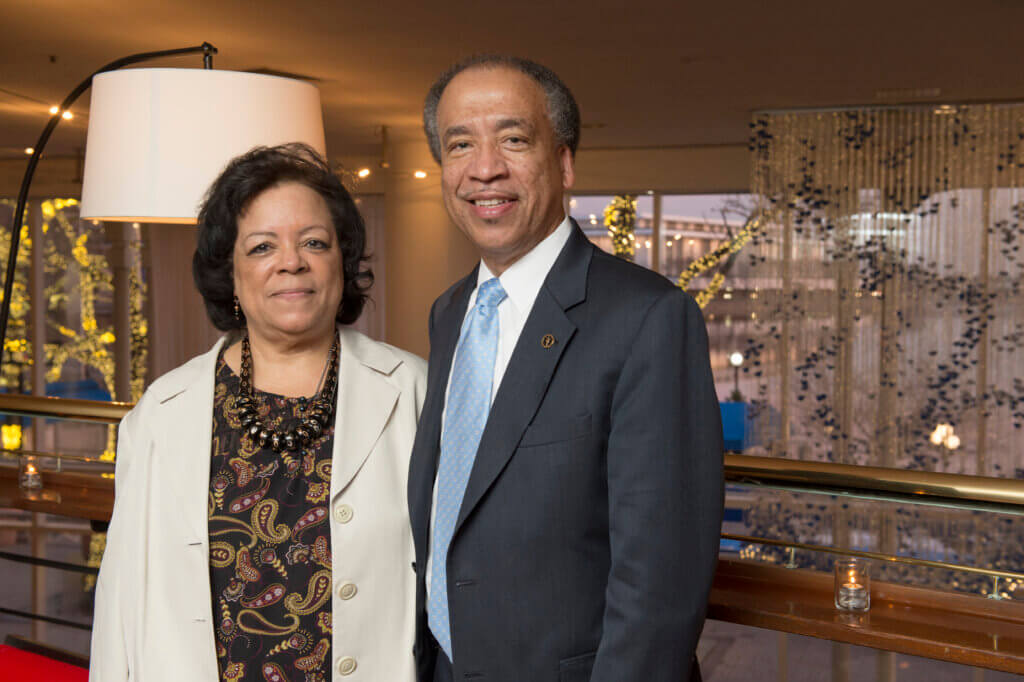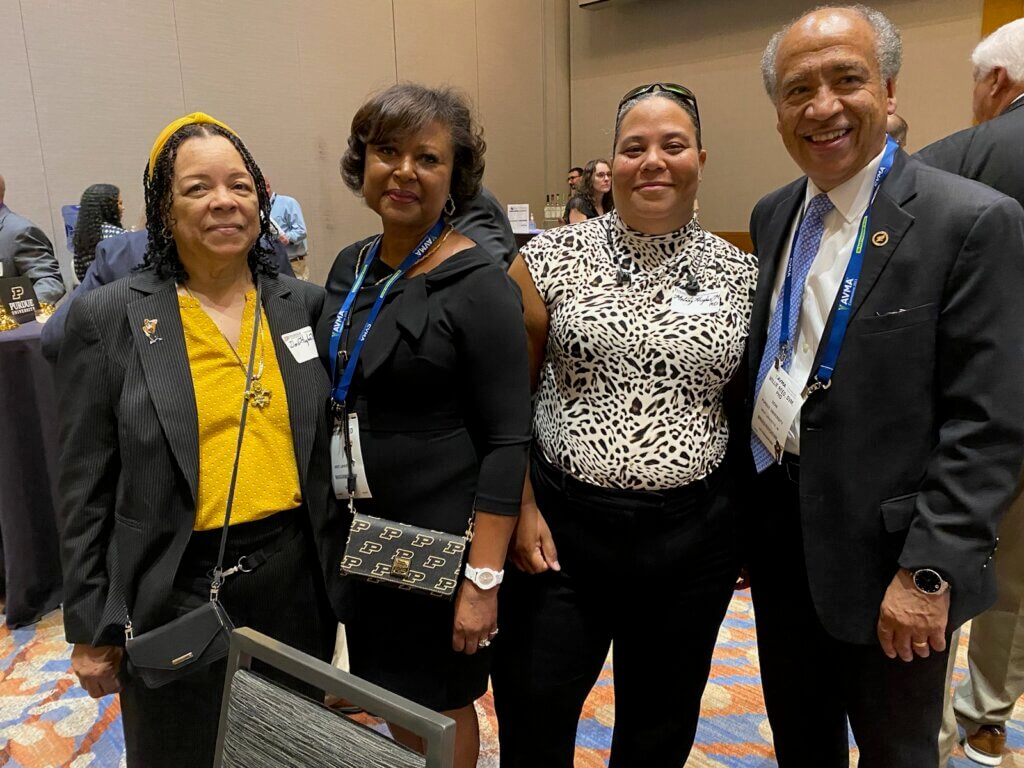
Dr. Doris Hughes-Moore (PU DVM ’73) recognizes the importance of preserving and honoring history. She’s president of the board for the Wilson Bruce Evans Home Historical Society, an organization with a mission to preserve the home and promote its historical significance as part of Black American history and culture in Oberlin, Ohio. She’s also the great-great granddaughter of Wilson Bruce Evans and his wife, Sarah Jane Evans.
The Evanses were Black abolitionists and Oberlin was known for its support of fugitives fleeing slavery on the Underground Railroad. In September 1858, Wilson Bruce Evans took part in the Oberlin-Wellington Rescue, an incident that gave rise to Oberlin’s reputation as “the town that started the Civil War.” He was one of 37 rescuers indicted for violating the Fugitive Slave Law of 1850 by aiding an escaped slave to freedom, a crime for which he spent 83 days in jail but was never tried.
One month later, Lewis Sheridan Leary, brother of Sarah Jane Evans, and John Anthony Copeland, nephew of Wilson Bruce Evans, left Oberlin without informing their families to join John Brown in his raid on Harpers Ferry. Leary was killed during the raid and Copeland was executed two months later. Lewis Sheridan Leary’s remains are interred at the John Brown Farm State Historic Site near Lake Placid, N.Y.
“When my ancestors left North Carolina to seek educational opportunities in the Midwest, it was not just for their own personal success — there was no such thing,” Dr. Hughes-Moore said. “It was to promote our people. It was important for our family to be part of the cause that was lifting up the advancement of others. Lewis Sheridan Leary and John Anthony Copeland did that, and they paid the ultimate price.”
But ask Dr. Hughes-Moore about her history-making turn as the first Black woman to earn a Doctor of Veterinary Medicine degree from Purdue University, and she shies away from her status as a trailblazer. “My success was achieved through the sacrifice of many people — not only the advancement of Black people in America, but the sacrifices so many people have made, in all ways, including our family,” Dr. Hughes-Moore says. “You do what you have to do and you strive for quality of experience for your family and your career satisfaction, but you don’t gloat about it. If my story is encouraging to others, I’m pleased about that, but I am not a peacock.”
Early Life
Her father was a physician who died when Dr. Hughes-Moore was three years old. Her mother, a Howard University graduate, moved the family to Washington, D.C., where Dr. Hughes-Moore and her two siblings were raised. They also spent summers with their maternal grandmother in rural Bricks, North Carolina, where the American Missionary Association, a Christian educational association founded in 1846 through an antislavery coalition, established schools for Black children in 1895.
Just as important in later years was spending summers with her maternal great aunt Dorothy Miller in Oberlin, Ohio in the very house her ancestors built. “Aunt Da”, as she was affectionately known, was a key figure in the District of Columbia Public Schools system and played a major role in the establishment of the vocational programs for the DC Public Schools.
“My grandmother graduated from Winston-Salem Teachers College and was a teacher her whole life,” Dr. Hughes-Moore said. “Her siblings graduated from Fisk University. We had ancestors who were graduates of Oberlin College. Our family always put great importance on getting an education as a means of advancing Black people and providing access to opportunities.”
It was during her time in North Carolina that Dr. Hughes-Moore learned about animal husbandry. Her grandmother kept chickens and bartered eggs with neighbors. Local farmers raised hogs for slaughter and used mules as work animals. She always loved animals and expressed empathy for the mangy country dogs she would encounter. The coastal plains of North Carolina felt like a world away from Washington, D.C.
“I remember running down those North Carolina country roads, wishing I wasn’t such a tenderfoot,” she said. “All the local kids could run barefoot on the gravel, but I couldn’t. We also learned to make do with what was around. Local girls would craft dolls from Bermuda grass. My grandmother had fields of daffodils behind her house and I remember watching them sway like dancers in the summer breeze. It was beautiful to experience all of that.”
Road to Purdue
A junior high science teacher nurtured Dr. Hughes-Moore’s interest in scientific discovery, particularly curing diseases. At the time, she was the only Black student in her seventh-grade class, but bolstered by her teacher’s encouragement and her family’s support, she was determined to pursue a career in science.
Dr. Hughes-Moore enrolled at Howard University and then transferred to Tuskegee University where she earned her bachelor’s degree. She also attended two years of veterinary school at Tuskegee, but when her then-husband transferred to Purdue to pursue a PhD in veterinary pathology, she decided to transfer to Purdue, too. Growing up in an integrated neighborhood in Washington, D.C., prepared her for the transition to Purdue after attending two HBCUs (historically Black colleges and universities).
The College of Veterinary Medicine’s first Black graduate, Dr. William Dunn (PU DVM’71), was only two years ahead of Dr. Hughes-Moore. She saw him in passing, but she didn’t dwell on the fact that they shared the status of being the first Black Purdue DVM graduates.
“I never thought about it,” she said. “It’s part of assuming that you’re supposed to do your best, regardless of the position you are in. You have to rise to the occasion and not view it as something exceptional. The advisors and faculty accepted me and made me feel like I belonged.”
While the faculty and staff were supportive, Dr. Hughes-Moore does recall one incident where a fellow student challenged her presence in the cohort. The student used a racial slur toward Dr. Hughes-Moore and rather than become angry, she attempted to educate.
“I said to him, ‘I hope you are learning that I’m just an ordinary person who is seeking an education. I hope my being here is enough to influence you to understand that we are all equal. I am not trying to stand out as an exception. I am part of the fabric of our people, not only Black people, but of this nation.’”
A career devoted to animal welfare
Following graduation, Dr. Hughes-Moore accepted a position as a research scientist for the Upjohn Company in Kalamazoo, Michigan. She and her then-husband founded their own research and development company, Hughes Research and Development, which provided a full spectrum of veterinary pathology services for nonclinical, safety and toxicology needs. She was then recruited to Howard University where she served as director of the veterinary clinical laboratory from 1984-2002. She left to direct the animal research facility at George Washington University for four years, but she was lured back to Howard in 2006. She actually retired from Howard in 2012, but returned in 2014 as director of veterinary services, a position she still holds.
“I never had an interest in a tenured academic position,” Dr. Hughes-Moore said. “My interest was in ensuring the proper welfare and humane treatment of animals. The government has very strict regulations and requirements for conducting labs.”
Howard University has been accredited by the AAALAC, International — formerly known as the Association for Assessment and Accreditation of Laboratory Animal Care — since the accreditation program, organized by a group of veterinarians and researchers, started in 1965. “Howard’s Black veterinarians saw a vision for the achievement of the highest standards of animal care and research,” she said.
Throughout her career, Dr. Hughes-Moore has honored the legacy of her own family and that of other Black families who paved the way for her progress. She’s also cognizant of her own role in fostering Black excellence in the next generation.
“I do my best to serve as a model for those who are coming through these doors,” she said. “Those of us who’ve had the opportunity to achieve have a responsibility to promote other people in that regard and to help them succeed. None of us succeeds alone.”


